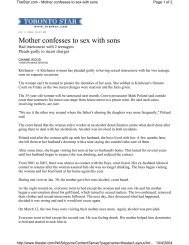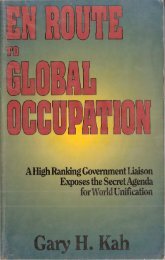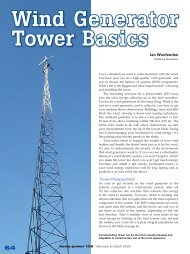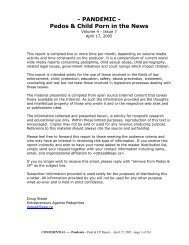G. Edward Griffin - The Fearful Master - PDF Archive
G. Edward Griffin - The Fearful Master - PDF Archive
G. Edward Griffin - The Fearful Master - PDF Archive
You also want an ePaper? Increase the reach of your titles
YUMPU automatically turns print PDFs into web optimized ePapers that Google loves.
week after the United Nations had launched its unprovoked attack, peace once again<br />
returned to Katanga; its green and white flag still fluttered proudly to proclaim that Katanga<br />
remained free.<br />
<strong>The</strong> only thing more incredible than the United Nations military action in Katanga is the<br />
way in which it tried to justify that action. If things had gone according to schedule there<br />
would have been little trouble. Press releases would have simply stated that Tshombe had<br />
been replaced by "moderate" Bochely-Davidson and that after a light exchange of gunfire<br />
"secessionist" Katanga had been brought back under the central government. <strong>The</strong> United<br />
States President would have sent his congratulations to Dag Hammarskjold and State<br />
Department officials would have expressed great satisfaction with this victory over<br />
Communism. But as it turned out, the situation had "escalated," and there were just too<br />
many newspaper reporters willing to make that hundred-mile trek to Northern Rhodesia to<br />
get the true story out to the world. 21<br />
At one point, the UN explained that it had initiated military action at the request of the<br />
central government. An official spokesman elaborated: "<strong>The</strong> UN motive in complying with<br />
the request was to avoid the alternative--invasion of northern Katanga by central<br />
government troops and a prolonged civil war." 22 In other words, the central Government<br />
was preparing to attack Katanga; but that would have been civil war. <strong>The</strong>refore, the UN<br />
attacked Katanga to save the central Government the trouble!<br />
As the fighting spread, it became apparent that the United Nations needed another story.<br />
As a result, it was decided to announce that the UN had nothing to do with starting the<br />
action at all--that it was merely defending itself against Katangese aggression. And so, on<br />
September 16, three days after the United Nations had stated it had initiated the action "at<br />
the request of the central government," Dag Hammarskjold, at a press conference, told<br />
this fantastic story:<br />
In the early hours of September 13th . . . an alert was set since arson<br />
was discovered at the UN garage. As the UN troops were proceeding<br />
toward the garage premises, fire was opened on them from the building<br />
where a number of foreign officers are known to be staying. UN troops<br />
were subsequently also resisted and fired at as they, were deploying<br />
toward key points or while they were guarding installations in the City. 23<br />
In the words of Conor O'Brien, the man who helped plan the attack:<br />
I have no idea what the source for the "arson" statement may be. No<br />
such fire was ever reported by me, or to me, or ever referred to in my<br />
presence. Nor is there any reference to such a phenomenon in the<br />
military "situation report." Some days before, an empty UN vehicle was<br />
upset and damaged by the "spontaneous demonstrators" outside a<br />
garage in the town (properly speaking, there was no "UN garage"). This<br />
incident, the nearest known to me to the "arson alarm," was no longer<br />
present to our minds on the morning of September 13 th . 24<br />
Just for the record, Operation Morthor comes from a Hindi word. Morthor does not mean<br />
"Sound the alarm; there is arson in the garage" or "Let us now assist the authorities to<br />
prevent civil war." It means smash!


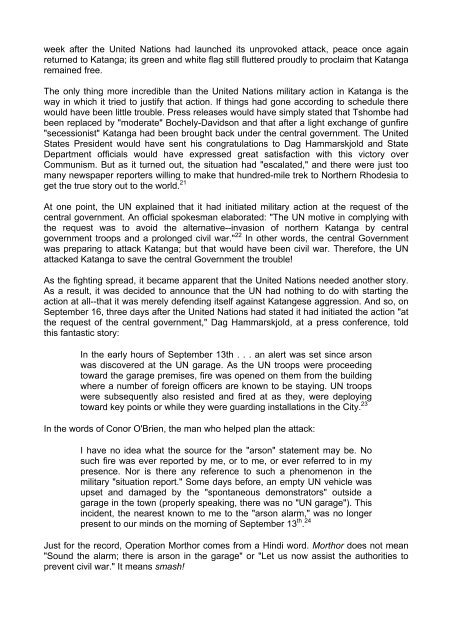
![Robert T McQuaid [rtmq@stn.net] Sent: Friday, October 29, 2004 12 ...](https://img.yumpu.com/51070071/1/190x245/robert-t-mcquaid-rtmqstnnet-sent-friday-october-29-2004-12-.jpg?quality=85)



